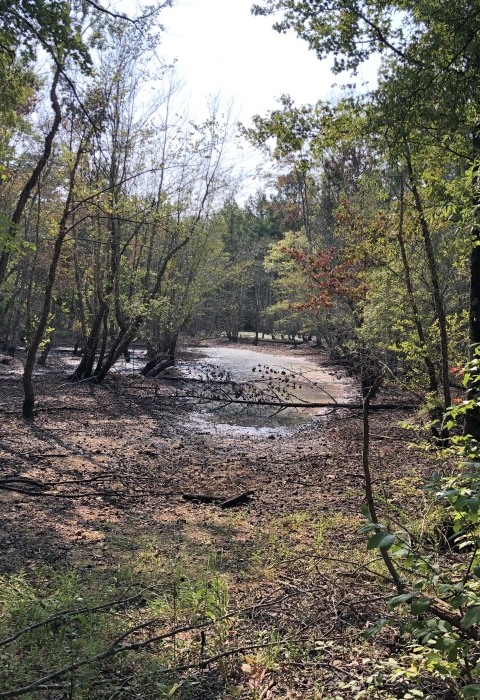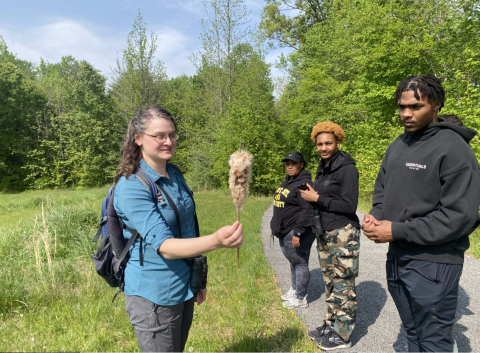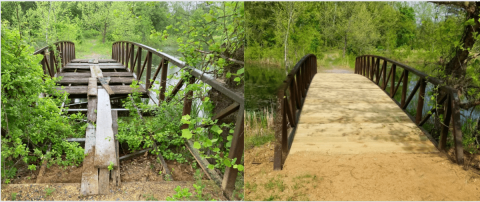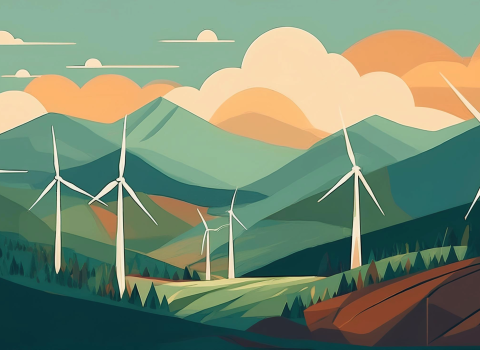Footsteps of students rushing to class echo across concrete, the purring engines of cars fill campus parking lots, and year after year, vast lecture halls buzz with questions volleyed forth by eager minds. These are some of the sights and sounds of university life for students at Bowie State University, the oldest Historically Black University in Maryland and one of the ten oldest Historically Black Colleges and Universities in the country, seated in the heart of Prince George’s County.
But just across from the parking lot at the north end of campus, the noise and the pace of university life falls away — giving rise instead to the soft hum of life that can only be found in an old growth forest. Mere feet from the university entrance, there are hundreds of forested acres stretching into an expansive landscape sprawling with wetlands, trails, and portions of the Patuxent River. For those seeking a respite from the campus grind, this green space is seemingly the perfect location.
Unfortunately, despite its proximity to campus and it’s potential to offer a space for recreation and exploration, the 86 acres of land within the university’s boundaries are relatively unknown to the majority of students on campus.
“A very small percentage of our student population have even been back there,” said Jabari Walker, Sustainability Coordinator at Bowie State.” Of the students that have gone there...they love it. They want to see students use it more and to see more people go there.”
In 2023, Walker partnered with Jenny McGarvey, Capacity Building Initiative Director for the Alliance for the Chesapeake Bay, to develop a proposal for transforming these forgotten woodlands into a community space for recreation, learning, and encouraging green career paths for students of color at the HBCU.
“I like to think of our guiding light in our partnership with Bowie State goes back to the 2020 Green 2.0 report,” McGarvey shared, reflecting on the partnership. “It assessed representation of people of color in environmental nonprofits around the United States. Across the board, environmental nonprofits have the lowest representation of people of color in the United States.”
With support from a Chesapeake Watershed Investments for Landscape Defense (WILD) grant funded by the U.S. Fish and Wildlife Service’s Science Applications program and the National Fish and Wildlife Foundation, Bowie State will develop a natural resources master plan for the 86 acres of woodlands and wetlands on campus, the adjacent Uhler Natural Resource Management Area owned by Maryland Park Service, and create opportunities for student involvement through paid-positions and faculty training.
This project is a part of a series of recent efforts to increase environmental engagement within the Bowie State community, including hiring staff members to address sustainability concerns on campus, facilitating guided tours of green spaces, and creating connections with environmental organizations around Prince George’s County through the Central Maryland Climate Career Expo, piloted by Jabari Walker. With support from this network of partners, Bowie State seeks to engage students through internships and entry level jobs, guided field experiences, and course integration.
In a similar vein, Patuxent Wildlife Refuge has fostered a collaborative relationship with Bowie State over these past years. Partnering with Bowie’s Biology department, the Refuge offers experiential learning opportunities, paid internships for students to work with Refuge staff, and supported the creation of Bowie State’s Outdoor Club for students to enjoy kayaking, hunting, and other recreational experiences.
A notable upgrade made to this green space involved funding from Maryland Park Service, a faithful community partner:
Over the past few years, these transformative connections have blossomed between Bowie State and community partners such as the Alliance for the Chesapeake Bay and the Patuxent Wildlife Refuge. These connections have created a deeper sense of community and empowerment. With funding from Chesapeake WILD and this new proposal underway, the future is bright.
“We are hoping this project will be the foundation for Bowie State students to have a space to live and work and play,” McGarvey said, adding, “It is going to be a jewel for the campus and for the State of Maryland.”






